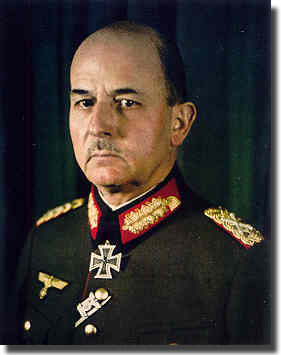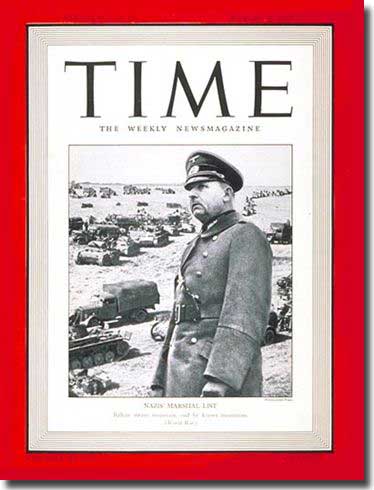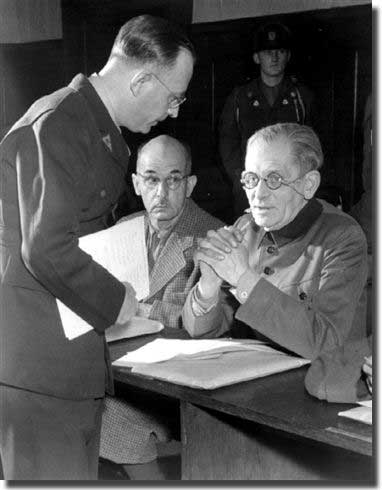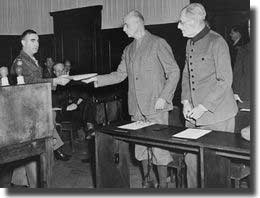|
Field Marshal Siegmund Wilhelm List. ( 1880-1971 )
WW1 Service. In the 1916 summer he was off to the East, and was in the Balkans, and with Turkish troops, in 1917 we find Wilhelm List back on the Western front as Operations Officer with the Bavarian 8th. Reserve Infantry Division. Promoted to Major in January of 1918, he went to Munich as an instructor at the Bavarian War Ministry, and was still in that position when the armistice came. Joins the Reichsheer post Versailles. Promoted to Lieutenant Colonel in 1924, then two years later List was named Chief of the Army Organisation Department in the Reichsheer Ministry, shortly after he made Colonel, and went on to be named a Major General on the 1st. of November 1930. He now took over as Commander of the Infantry School at Dresden, an important command. List runs foul of the Nazi regime. He had a good reputation as a calm, cool, rational, and methodical General Staff Officer, and Heinz Guderian, not renowned for getting along with his bosses, later spoke warmly about List, and recalled his "chivalrous nature " Promotion comes. In another three years he made it to General of Infantry, and at Dresden, Commander of Wehrkries IV. This military district embraced the 4th, 14th, and 24th Infantry Divisions and Frontier Command 5. At this stage Wilhelm List had climbed to now be number eight on the Army's seniority list. The Blomberg-Fritsch Crisis. In 1938 when many higher Army Officers were purged, List escaped this fate, and in that February replaced Ritter von Leeb in command of Army Group 2 at Kassel. But he was soon to move again, on the 12th. of March 1938, Austria became part of the Third Reich, and General Fedor von Bock commanded the occupation forces, this rather arrogant type Prussian Officer did not take long to offend Austrians, a softer approach was needed, and General List was given this task, and he now set up Army Group 5 HQ in Vienna. Czechoslovakia falls without invasion. He directed the occupation of Southern Moravia, now looked upon as pro Nazi, Wilhelm was promoted at 59 on the 1st. of April 1939 to Colonel General. Poland invasion. His HQ now designated Frontier Army Command South, plus List was named Military Government Commander Krakow. This assignment lasted but one month as List was given command of the new 12th. Army, set up for the coming invasion of France. Our Colonel General had command of six Infantry Divisions, the 1st. Mountain Division, Panzer Group Kleist, which had five tanks divisions with Guderian's XIX , plus Reinhardt's XLI motorised corps. In the dash for the English Channel, List made a name for himself, he moved his forces so fast that Hitler got cold feet and called a halt, to allow the infantry to catch up with the Panzers. Guderian ignored the order, leading to an angry clash with Kleist, and Guderian resigned. Rundstedt sent off a message to Guderian to stay where he was, General List was going to him to settle this problem. List proposed a solution, he would evade the Fuerher's order to halt the tanks, Corps HQ would stay where it was, but Guderian could conduct " reconnaissance in force " List was quite aware that Guderian would interpret this as giving him the green light to press on, and that is just what he did, reaching the Channel on the 20th. of May to trap British, French and Belgian forces in the north. List faced the French to his south, expecting a counter offensive that did not materialise, he commanded twelve infantry divisions, four Panzer and three motorised divisions, and was criticized for having his infantry secure bridgeheads across the Aisne River before using his armour. His plan caused confusion and clogged the roads, it might well have had dangerous consequences had not France being on the verge of surrender. List broke through the Weygand Line, pushed past the Maginot Line all the way to the Swiss border. Field Marshal. The Balkans beckon. But before this action could come to pass, on the night of the 26/27th. of March 1941, a coup deposed Prince Paul in Yugoslavia, and he was replaced by an anti Nazi junta under General Richard. D. Simovic. List needed to quickly secure his right flank and help General Baron von Wiech's 2nd. Army in invading Yugoslavia. Operation Marita, the invasion of Greece. The British were about to enter this scene, rushing troops from North Africa to Greece, the Australian 6th. Division, the New Zealand 2nd. Division plus the British 1st. Tank Brigade from their 2nd. Armoured Division were deployed north of Mount Olympus, designed to block any move by List if he was able to outflank the Greek Metaxas Line. West of the Allied forces were 14 Greek Divisions in a struggle with the Italian 11th. Army in Albania. He had quickly summed up that the weak link was the Yugoslav 5th. Army, and on the 6th. of April he struck them before the Yugoslavs were fully mobilized. His forces turned south thereby outflanking the Mexatas Line, by the 9th. of April Salonika was taken, and the 2nd. Greek Army was encircled, it gave up and surrendered on the 10th. of April. Panzer XL pushed past the 5th. Yugoslav Army and headed for Kozani, moving to outflank the Australians and New Zealanders, and also putting the 1st. Greek Army in Southern Albania at risk of being encircled. The Alliies tried to stop the German juggernaut but were beaten by the panzers, and Kozani was captured on the 10th. of April as the Allies retreated. The Greek 1st, Army realising their perilous position began evacuating from Southern Albania on the 13th. of April, but List reacted too quickly for them, his 73rd. Infantry Division blocked their retreat through the Pindus Mountains on the 15th. and by the 20th. of April the Greeks were surrounded, and they surrendered the following day. List had acted totally independently of his supposed brothers in arms the Italians, and Mussolini contacted Hitler to demand that the defeated Greeks also surrender to his forces. In the Greek campaign the Italian Army suffered some 63,000 men lost, but still had half a million in the field, Hitler to placate the Duce had Jodl renounce List's actions, and the humbled Italians had a second Greek surrender ceremony at Salonika on the 23rd. of April.
Allied General Maitland orders evacuation of Greece. But this evacuation cost the Allies most of their heavy equipment, the tanks of the 1st. Tank Brigade and about 8,000 vehicles. Athens fell on the 27th. of April and three days later it was all over. List's troops took 90,000 Yugoslav, 270,000 Greek, and 12,000 British, Australian and New Zealand prisoners, on the other side of the coin he lost 1,100 killed and another 4,000 missing or wounded. The Field Marshal had run a brilliant and successful campaign in Greece. His 12th. Army remained in occupation in Greece, and List was appointed C-in-C South East on the 10th. of June in 1941, remaining in that post until October, he became ill and was replaced by General of Engineers Walter Kuntze. List was without a command over the next 9 months. List's Final Campaign. List was given the task of seizing Rostov, and then occupy all of the eastern coast of the Black Sea, grab the Caucasus oil installions, and press on to Baku, 11th. Army was slated to capture Sevastopol, which had been beseiged since October 1941. On the 2nd. of July, Sevastopol was finally taken, but now Hitler took away the 11th. Army, sending it off to Army Group North to attack Leningrad. Rostov falls. On the 12th. of August 1942 List had command of a total of nineteen Divisions, six were mobile, but then nine of them were made up of foreign divisions, not as formidible as his strength appeared on paper. List was hardly enamoured with his task, he had but 400 tanks and his enemy were two full Soviet Army Groups and another two in reserve. From Rostov to Baku was 700 miles, his front a frightening 800 miles long, and several rivers blocked his path forward, the terrain was tough, and the Soviet airforce ruled the skies. No longer did the Soviets try to always hold on, they would now retreat if encirclement threatened. Caucasus offensive begins on the 25th. of July 1942. It was hot, the local temperature 100 degres F, the infantry was covering 30 miles a day, a bridgehead across the River Kuban was established, and on the 10th. of August, Krasnodar the capital of Kuban region was in German hands. On the same day the panzers arrived at Maikop, the centre of the West Caucasus oilfields, but the oil installions were burning furiously, lit by the departing Russians. On the 6th. of September the Novorrossiysk naval base was taken, and 1st. Panzer Army were over the Terek River advancing along the northern foothills towards the Groznyy oil centre. But now Army Group A were forced to slow their advance, the long supply lines taking their toll, and increased Soviet resistance putting the advancing Germans on the defensive. Although hard to believe, camels were pressed into service to carry much needed fuel. The Fuerher summoned List to meet with him at Vinnitsa at the end of August, bringing with him only a small scale map, upsetting Hitler, who ignored his express orders to his Generals not to carry marked maps on aircraft flights. Although Hitler is reported of being both friendly and understanding in front of List, plus approving his plans to advance to the Groznyy oilfields, behind his back he railed at both Halder and Keitel for first suggesting List's appointment. In the first instance Hitler had been tardy about giving List an Army Group, he had no affinity with the Field Marshal and never liked him. Over his support of List, Colonel General Franz Halder when Chief of the General Staff was sacked to wind up in a concentration camp. But Hitler was determined to get rid of List, sending Keitel to his HQ to do his dirty work, List resigned on the 9th. of September 1942, at first Hitler himself took over the task as C-in-C Army Group A, but finally Kleist took over this command. List retires into obscurity.
Pardoned and released in 1952.
Conclusion. His Polish campaign was good, and in both Yugoslavia and Greece I would rate him as a brilliant performer, again in Russia he did, in my view, do well. One cannot rate him as a defensive General as he never ever conducted a retreat. He was amongst the most capable and successful of Hitler's Field Marshals, but was not given the kudos he deserved, he had served his Fuerher with dedication and ability. He was a most underrated officer whose diplomacy with his subordinates paid big dividends.
See the Index to "Adolf Hitler and his WW2 Field Marshals" |

 Wilhelm, the son of a country Doctor, was born on the 14th. of May in 1880 in Oberkirchberg, Wuerttemburg in South West Germany. He was never perceived to be amongst the top echelon of the WW2 Reich Field Marshals. Joining the Army as an Officer Cadet on the 15th. of July 1898, he was part of the Bavarian 1st. Engineering Battalion. Two years later he gained his commission as a Second Lieutenant, and it took him until 1908 to be promoted to First Lieutenant or Oberleutnant. Now he went off to the War Academy to undergo General Staff training. His Captaincy came in 1914, and when WW1 erupted, he was a member of the Bavarian General Staff at Munich.
Wilhelm, the son of a country Doctor, was born on the 14th. of May in 1880 in Oberkirchberg, Wuerttemburg in South West Germany. He was never perceived to be amongst the top echelon of the WW2 Reich Field Marshals. Joining the Army as an Officer Cadet on the 15th. of July 1898, he was part of the Bavarian 1st. Engineering Battalion. Two years later he gained his commission as a Second Lieutenant, and it took him until 1908 to be promoted to First Lieutenant or Oberleutnant. Now he went off to the War Academy to undergo General Staff training. His Captaincy came in 1914, and when WW1 erupted, he was a member of the Bavarian General Staff at Munich.

